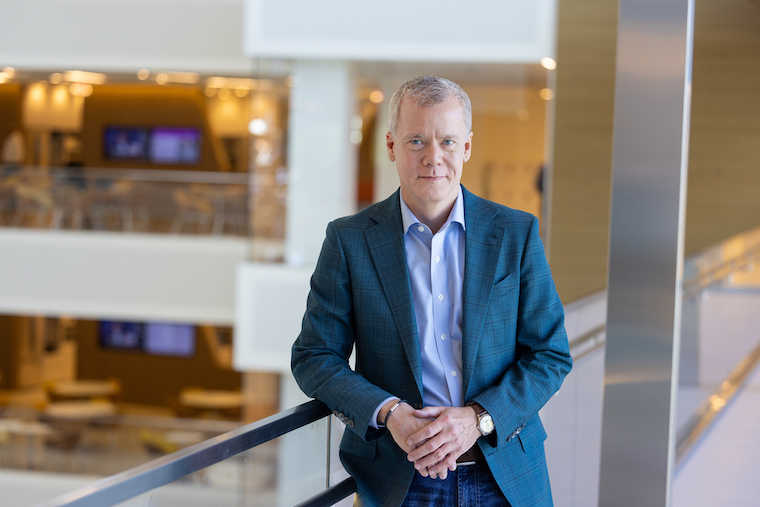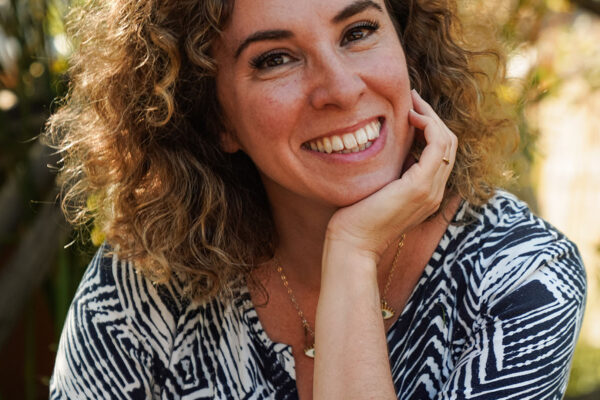“There’s nothing more exciting than knowing that what you do at work has the potential to change people’s lives,” says Chris Boerner, AB ’93. “I see the impact we’re making on global health every single day.”
As board chair and CEO of Bristol Myers Squibb (BMS), Boerner leads a company at the forefront of biopharmaceutical innovation, specifically in oncology, hematology, immunology, cardiovascular disease and neuroscience. During his time in the industry — more than 20 years — he says the rate of innovation has increased dramatically.
“When I was at WashU, HIV/AIDS was pretty much a death sentence,” he says. “Thanks to companies like BMS, it’s now a chronic disease — and there’s hope that eventually it will be curable.”
With an ever-increasing understanding of the biology of disease, BMS employs new techniques to treat a wide range of health conditions. One example is cellular therapy, where healthy cells are put into the body to replace diseased or damaged ones. “These new modalities allow us to help more patients in areas like cancer, Alzheimer’s disease and cardiovascular disease,” Boerner says. “Advances in technology, like AI and machine learning, can increase the pace of innovation even more dramatically. It’s exciting to think what the future could hold.”
“Advances in technology, like AI and machine learning, can increase the pace of innovation even more dramatically. It’s exciting to think what the future could hold.”
Chris Boerner
Boerner’s optimism stems from a host of projects in the pipeline at BMS. The company is working toward using cell therapy to treat autoimmune diseases, as well as using targeted oncology therapy and radiopharmaceuticals to treat cancers that were previously intractable. Through another modality, protein degradation, the company aims to destroy inactive or mutated proteins in solid tumors. BMS also has plans to launch a drug for schizophrenia and Alzheimer’s disease psychosis. “The advances we’re making are incredible!” he says.
So how did a history and economics major end up as a leader in the biopharmaceutical industry? After graduating from WashU, Boerner studied the economics of innovation at the University of California, Berkeley. He focused his dissertation on the factors that drive innovation in the pharmaceutical industry and later accepted a job with management consultancy McKinsey & Company, which serves pharmaceutical and biotechnology companies. Boerner then moved to Genentech, serving as a marketing leader for oncology products, before heading to Seattle Genetics, Inc., where he held several leadership roles. He joined BMS in 2015 and became CEO in 2023.
“While my initial interest in pharma was academic, it became much more personal after I lost a close relative to cancer,” Boerner says. “I decided to dedicate my professional life to helping patients and their families avoid going through what my family and I did.”
Boerner encourages students interested in the pharmaceutical field to “take advantage of the incredible resources available at WashU. It has one of the top medical schools in the world and leading programs in biology and chemistry. I wish I had taken more than just one biology course when I was there!”
Because of his positive experience at WashU, Boerner stays involved by serving on the Arts & Sciences National Council, and he and his wife sponsor a scholarship. “I’m grateful for the significant financial support I received,” he says. “Now I’m paying that generosity forward.”
Boerner is also dedicated to increasing access to medicines worldwide. “At BMS, we don’t feel our job is done until patients are actually benefiting from our cutting-edge medicines,” he says. “Access to medicine is highly disparate based on geographic area, ethnicity and socioeconomic status, so BMS and the Bristol Myers Squibb Foundation, an independent 501(c)(3) organization, made individual commitments to invest $150 million to advance health equity by 2025.”
Additionally, the BMS Foundation, which is primarily funded by BMS Co., partnered with Baylor College of Medicine to build the core infrastructure needed in sub-Saharan Africa to deliver HIV/AIDS medicines. “Mother-to-child transmission of HIV was a huge problem in that region, and thanks to our efforts with a number of local partners, we’ve made a dramatic impact,” Boerner says. In fact, the World Health Organization announced that the Republic of Botswana, one of the countries where the BMS Foundation operates, had achieved a mother-to-child HIV transmission rate of less than 5% — a dramatic decrease from earlier decades.
“Now we’re focused on providing lifesaving treatments to children with cancer in sub-Saharan Africa, which has a devastating child mortality rate,” Boerner says. “Contributing to global health is important. The pharmaceutical industry is a phenomenal space to be in, and I’ve never been more excited about the potential.”



